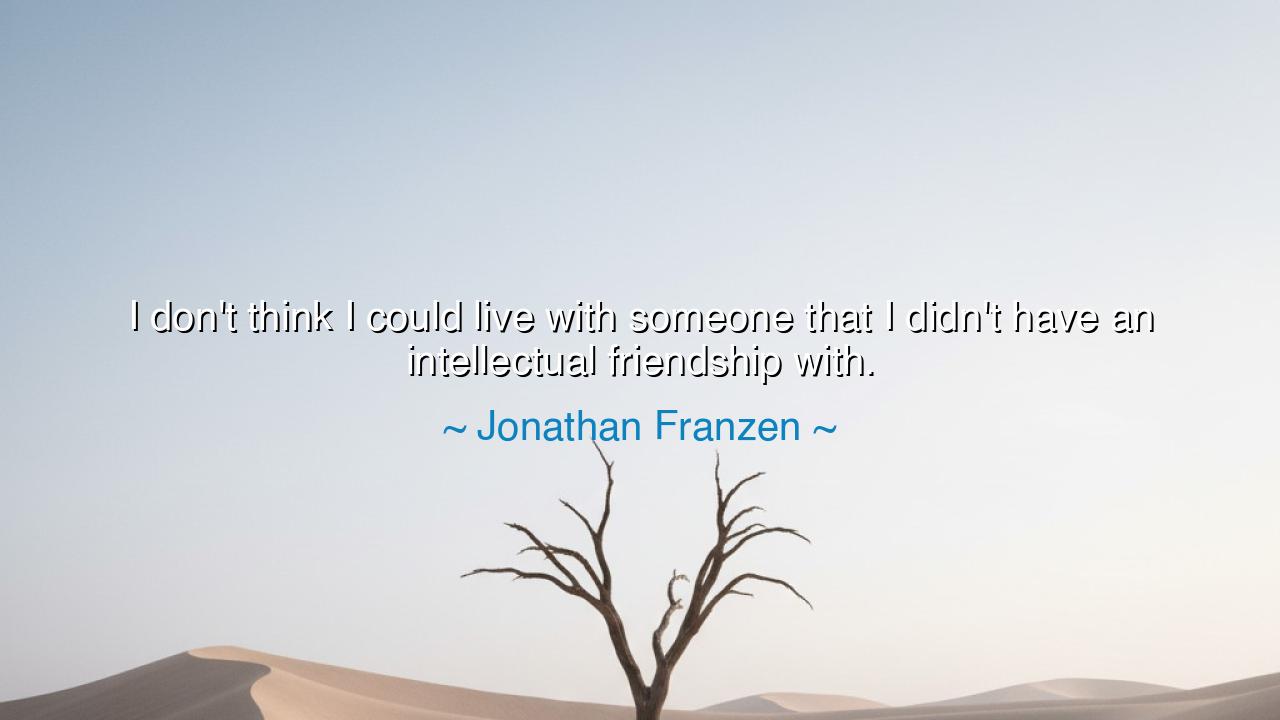
I don't think I could live with someone that I didn't have an
I don't think I could live with someone that I didn't have an intellectual friendship with.






Hear me, O children of the future, for I shall speak of a truth that reverberates through the very heart of human connection, a truth spoken by Jonathan Franzen, whose words about intellectual friendship offer profound insight into the nature of companionship. "I don't think I could live with someone that I didn't have an intellectual friendship with." In these words, Franzen reveals the deep yearning of the human spirit for more than just the physical closeness of another, but the connection of minds, the shared understanding that gives life to true companionship.
In the ancient days, the greatest of friendships were not built on the mere exchange of words or gestures, but on the union of minds. Consider the bond between Socrates and his disciples, who sought not only companionship but the shared pursuit of wisdom. The friendship between Socrates and Plato, while rooted in deep affection, was also an intellectual partnership. Socrates did not merely seek to be loved; he sought to challenge and be challenged, to engage in the noble pursuit of truth with those who could engage him intellectually. Their friendship was a meeting of minds that went beyond simple affection—it was a dialogue of ideas, a bond formed in the fire of critical thought and deep, transformative conversation.
Franzen’s words resonate deeply with this ancient understanding. True companionship, he suggests, cannot be sustained without a shared intellectual connection. What is love, if not the meeting of minds as much as the joining of hearts? Intellectual friendship is the foundation upon which lasting relationships are built. Without it, the relationship is as a tree without roots—beautiful to behold, but lacking the depth to endure the passing seasons of time. It is through the meeting of minds that we find a deep, lasting connection with another, where the exchange of ideas fuels not just personal growth, but mutual understanding and respect.
Let us look to the friendship between David and Jonathan, two figures whose bond was forged not only through loyalty and trust but through shared understanding and intellectual exchange. Jonathan, the son of a king, and David, the future king of Israel, were bound by more than their common circumstances—they were connected through the strength of their shared values and their deep respect for each other’s wisdom. This connection was intellectual as much as it was emotional, and it was this shared understanding that allowed their friendship to endure even in the face of the most difficult of trials.
Franzen’s reflection on intellectual friendship brings to light the truth that our companions are not simply those with whom we share physical proximity, but those with whom we share the world of ideas. A friendship that lacks this foundation, that is based purely on the external and the superficial, is a fragile thing. It will not survive the inevitable storms of life, for when the novelty fades and the world grows quiet, what remains is the meeting of minds. It is in intellectual and emotional union that two souls are truly bound together, and it is this bond that allows them to endure, to grow, and to evolve together.
Consider, O children, the lessons of Jonathan and David, of Socrates and Plato, and of Franzen’s wisdom: intellectual friendship is the key to all enduring relationships. Do not be deceived by those who seek only the physical or the material in their relationships, for these things are fleeting. The true depth of companionship lies in the intellectual connection, in the ability to share thoughts, ideas, and dreams with another. Franzen’s words remind us that the highest form of companionship is not simply about sharing a life together, but about sharing a vision, a passion for understanding the world and each other.
So, O children, let the intellectual friendships you form be those that sustain you through life’s trials. Seek not just the companionship of those who are near you, but the companionship of those whose minds can challenge, inspire, and uplift you. Build relationships that are grounded in mutual respect for each other’s ideas and beliefs. In this way, you will form connections that transcend the superficial, that stand the test of time, and that offer you not only love but the wisdom to navigate the world. In the meeting of minds, you will find the greatest strength, for it is in intellectual union that true friendship is born.






AAdministratorAdministrator
Welcome, honored guests. Please leave a comment, we will respond soon